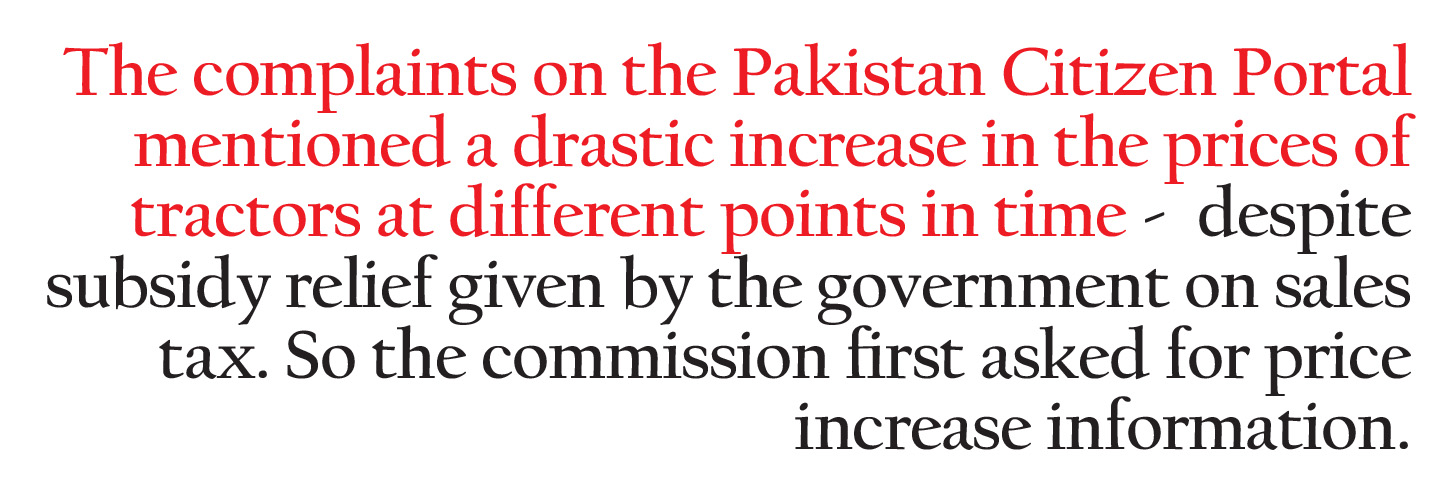No, it’s not just you. Several Pakistanis last year thought exactly the same. Perhaps in another era they would have protested, written to a newspaper, or even (why not) tweeted their thoughts. Not these days – apparently a bunch of people complained about tractors to the Pakistan Citizen Portal, a government owned and operated app designed as a grievance redressal system.
And the volume of messages was enough that the one institution definitely noticed: the Competition Commission of Pakistan. They began an inquiry on April 21, 2021 (after preliminary investigation in 2020), and just published their report on September 13. Based on their findings, the Commission wants to fine two tractor manufacturers: Millat Tractor and Al-Ghazi Tractor, under Section 30 of the Competition Act. The alleged crime? Colluding to intentionally raise prices of tractors for more profit.
To understand how we got here, it helps to have some context on the tractor industry in Pakistan. Tractors account for 7% of large-scale manufacturing in Pakistan. Tractor sales jumped 55% in fiscal year 2021 – and around 96% of that is manufactured in Pakistan. The actual structure of the tractor market, according to the Commissions, is oligopolistic. Millat Tractors has a 70% market share, while Al Ghazi Tractors have a 29% market share. The former has a production capacity of 40,000, while the latter has a production capacity of 30,000.
The complaints on the Pakistan Citizen Portal mentioned a drastic increase in the prices of tractors at different points in time – despite subsidy relief given by the government on sales tax. So the commission first asked for price increase information. Turns out the two companies had in fact increased their prices at various intervals: Millat Tractors had increased prices in October 2018 (1 – 5%), July 2019 (7 – 13%), March 2020 (2 – 3%) and July 2020 (5 – 7%); while Al Ghazi had increased prices in October-November 2018 (3 – 5%), July- August 2019 (5 – 10%), March 2020 (1 – 4%) and July 2020 (5 – 7%).

When asked about the prices, the two companies cited increases in the price of steel, prices of gas, mounting inflation, increase in import duties on certain raw materials, and the devaluation of the rupee against the dollar.
There was only one problem: some of that information did not hold up. For instance, the whole increased costs of goods because of the rupee devaluation. The enquiry found that in fact, local procurement accounted for more than 60% of the total procurement of parts for tractors in the last three years for tractors, It was even more stark for Al Ghazi, at 92%.
The enquiry also found other evidence: that before ploughing and after harvesting season, the demand for tractors shoots up. An artificial shortage is allegedly created by the tractors manufacturers, and the average delivery time is three months despite a 100% advance paid to them. This was confirmed from randomly selected dealers in Rawalpindi. The dealers also mentioned that the tractors would be transferred in the name of the buyer after three months.
“Given the extent of localization in the tractors industry i.e. more than 90% and the absence of any technological advancements made by the tractor manufacturers, a price increase move made by the market leader (MTL) followed by the second biggest market player (AGTL) indicated the likelihood of collusion in the tractors industry. A news item dated June 19, 2021 published in the Dawn News reported “Tractor assemblers have increased prices by Rs.92,000-196,000 in the last one year despite high level of localisation.”, noted the report.
The commission then authorized two teams of officers on August 31 for an enter in search of the premises of both companies. Apart from such valuable computer documents, files, and other data, the teams also got access to private whatsapp conversations of certain company individuals. These conversations showed a clear collusion. For example one from June 2019 reads like this:
Official Al Ghazi
“Sir Jee when you are increasing…?”
Official Millat
“May be in July,”
Official Al Ghazi
“OK sir”
And when the price was finally increased in an official notice, another message for Al Ghazi to Millat:
“Bohat deyr kardi mehr ban atay atay,” (Collusion, desi style).

As the report notes: “It is surprising to note that the officials of two competitors have developed such a cordial business relationship that business suggestions for controlling and limiting the quantity supply of tractors in order to realize gains in terms of price and bookings are candidly being discussed…the sharing of future intent to increase prices with competitor reduces the uncertainty of the competitor’s conduct and helps to predict each other’s future behaviour as well as promote coordinated behaviour which consequently distorts the competition in the relevant market.”
Will the fine prove anything? Let’s see. But it is nonetheless disheartening. Competition is what allows innovation to happen, but the lack of quality tractors at affordable prices to farmers affects the rate of mechanization in Pakistan. And that’s a shame for our supposedly agrarian economy.









